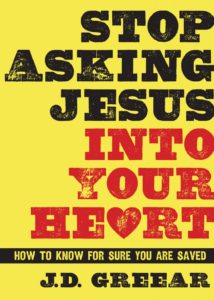Review by Aaron Lumpkin
Greear, J.D. Stop Asking Jesus into Your Heart: How to Know for Sure You Are Saved. Nashville: B&H Publishing Group, 2013, xiv+128p., $12.99, hardback.

Have you asked Jesus into your heart? J.D. Greear has. A lot. In fact, he believes he may hold the world record for doing this. In Stop Asking Jesus into Your Heart, he provides a retelling of his own journey in answering this question. If you don’t know J.D., you should, not simply because of the warm recommendations in the beginning of the book but because of his honest and forward approach to handling difficult questions that speak truth into the lives of his readers.
J.D. serves as pastor of The Summit Church in Raleigh-Durham, North Carolina. He is the author of Breaking the Islam Code: Understanding the Soul Questions of Every Muslim (Harvest House 2010) and Gospel: Recovering the Power that Made Christianity Revolutionary (B&H 2011).
In this book, J.D. argues that the phrase “once saved, always saved” is incomplete. Assurance comes not from a prayer but from a lifestyle characterized by belief and repentance. He believes that until you and I have assurance of our salvation, our spiritual lives will not “take off.” For this reason, the issues at hand become all the more important.
J.D. founds his understanding of assurance on God and the gospel. Our salvation is from God alone. Our belief in God’s commitment to us directly affects our ability to commit to him. God’s commitment to us is most evident in the gospel – he gives us his Son. J.D. explains what it means to believe the gospel and to act on this belief. In fact, “Repentance and belief are, biblically speaking, parts of the same whole” (40). Belief is more than an ascent to facts. It involves volition. It is trust in the work of Christ that brings about a “new posture” towards his Lordship over your life. Repentance is a part of this belief. It is belief in action that leads to a change of action because of Christ’s Lordship in your life. J.D. provides practical comparisons and contrasts to help us understand the differences, and he challenges us with the implications for our lives today. Overall, he contends that “salvation is a posture of repentance and faith toward Christ that you adopt at your conversion and maintain for a lifetime” (87).
J.D. does not hide from difficult matters either. He explores tough passages like Hebrews 6:4-6, which has caused many Christians to think they can lose their salvation. He provides an excellent response to this issue that leaves us encouraged and ready to finish the race God has set before us. In addition, he explores evidences of salvation, summarized as love for God and love for people. J.D. also challenges those who struggle with continual doubt to keep believing the gospel. All of our spiritual troubles in this life are answered by believing the gospel. He also provides two short appendices on baptism and on justification that are full of wisdom as well.
This book comes at a much needed time in today’s church. I wish that I had read this years ago when I struggled with knowing if I was saved because I, like J.D., have asked Jesus into my heart more times than I can count. Maybe you have, too, or maybe you know someone who has. This book is an extraordinary resource. It will bring you many laughs as he recounts much of his own life story, and it will bring you many challenges as you examine yourself and consider the great God of our salvation who brings us from death to life. I highly recommend this book to all!
